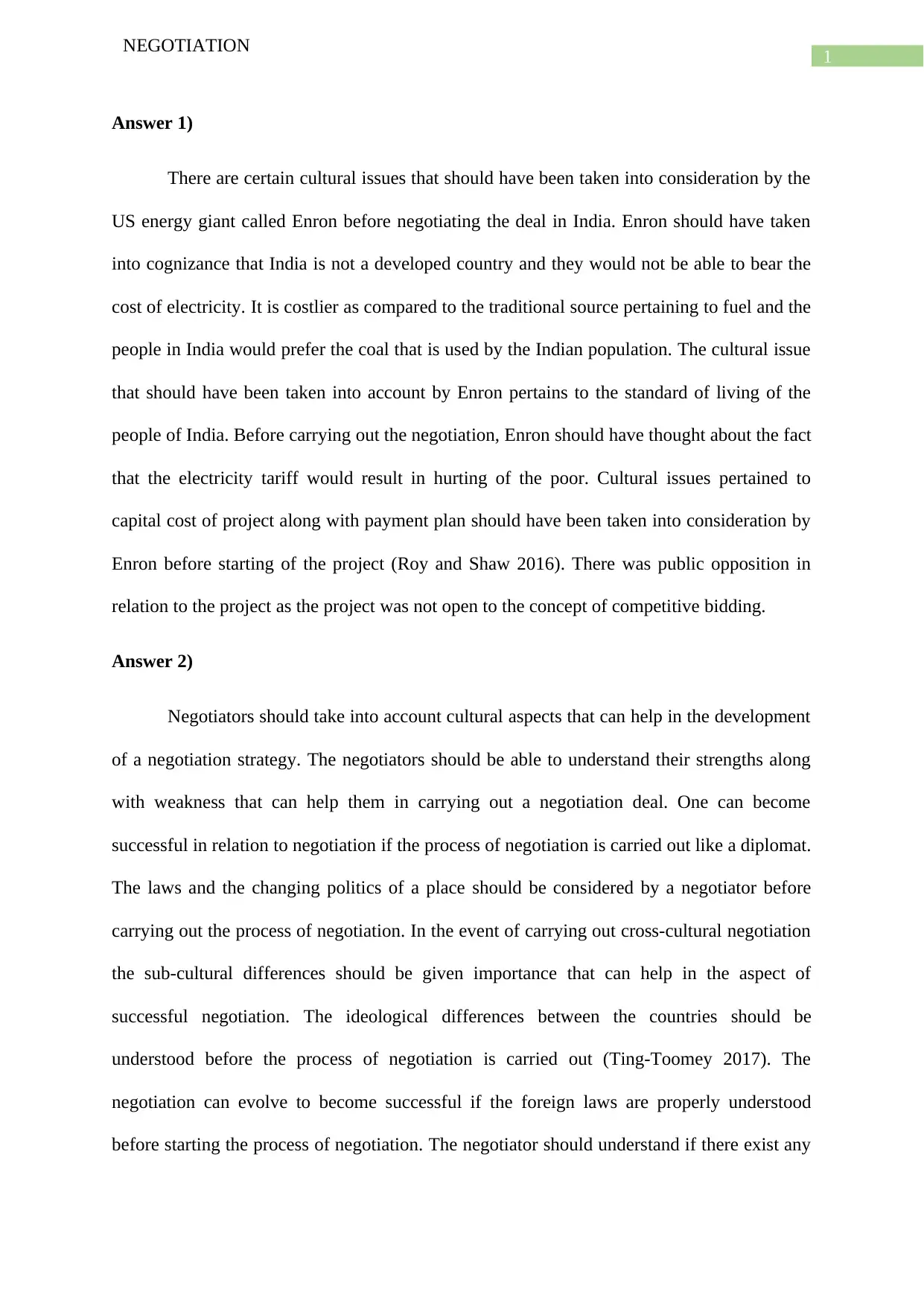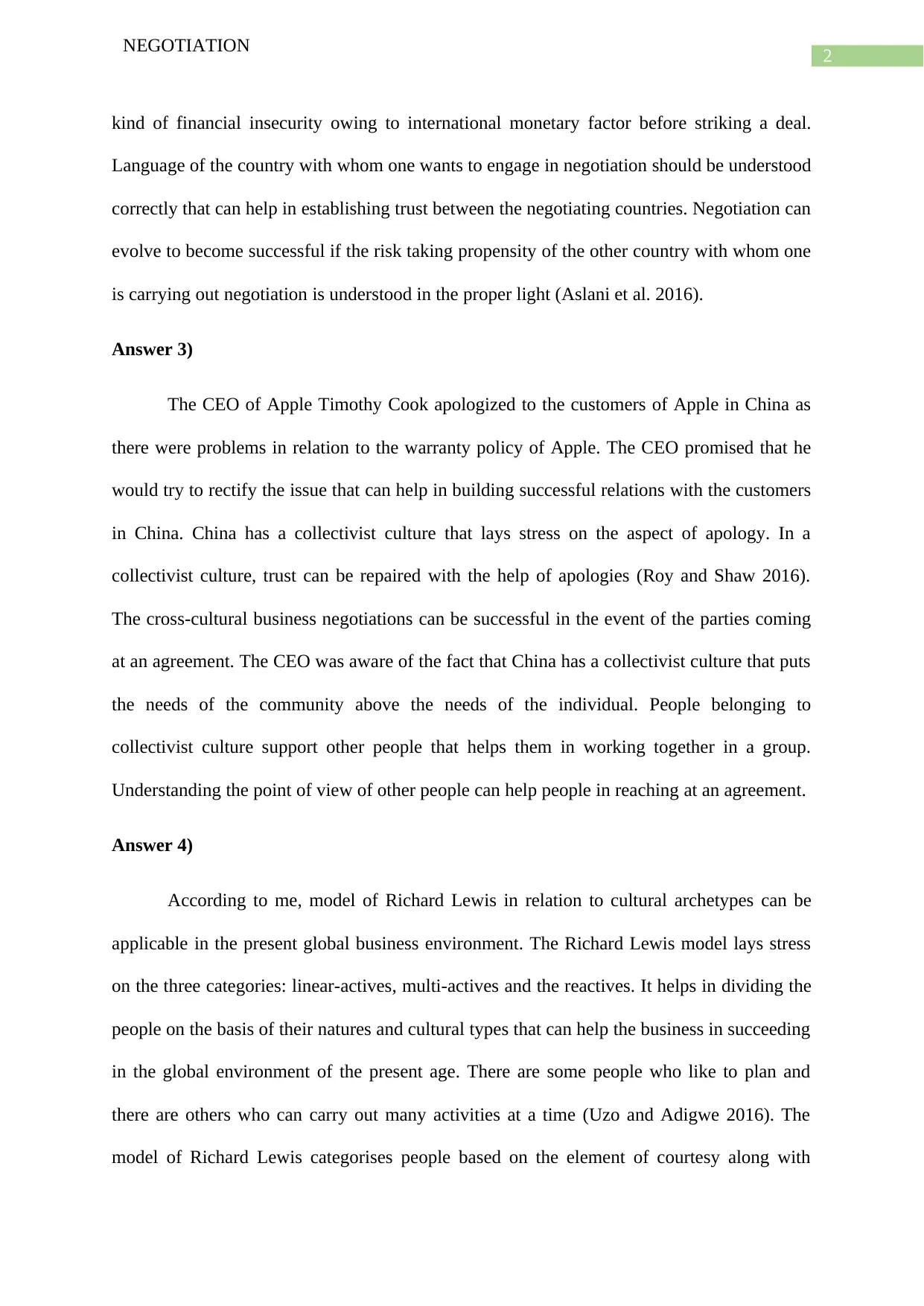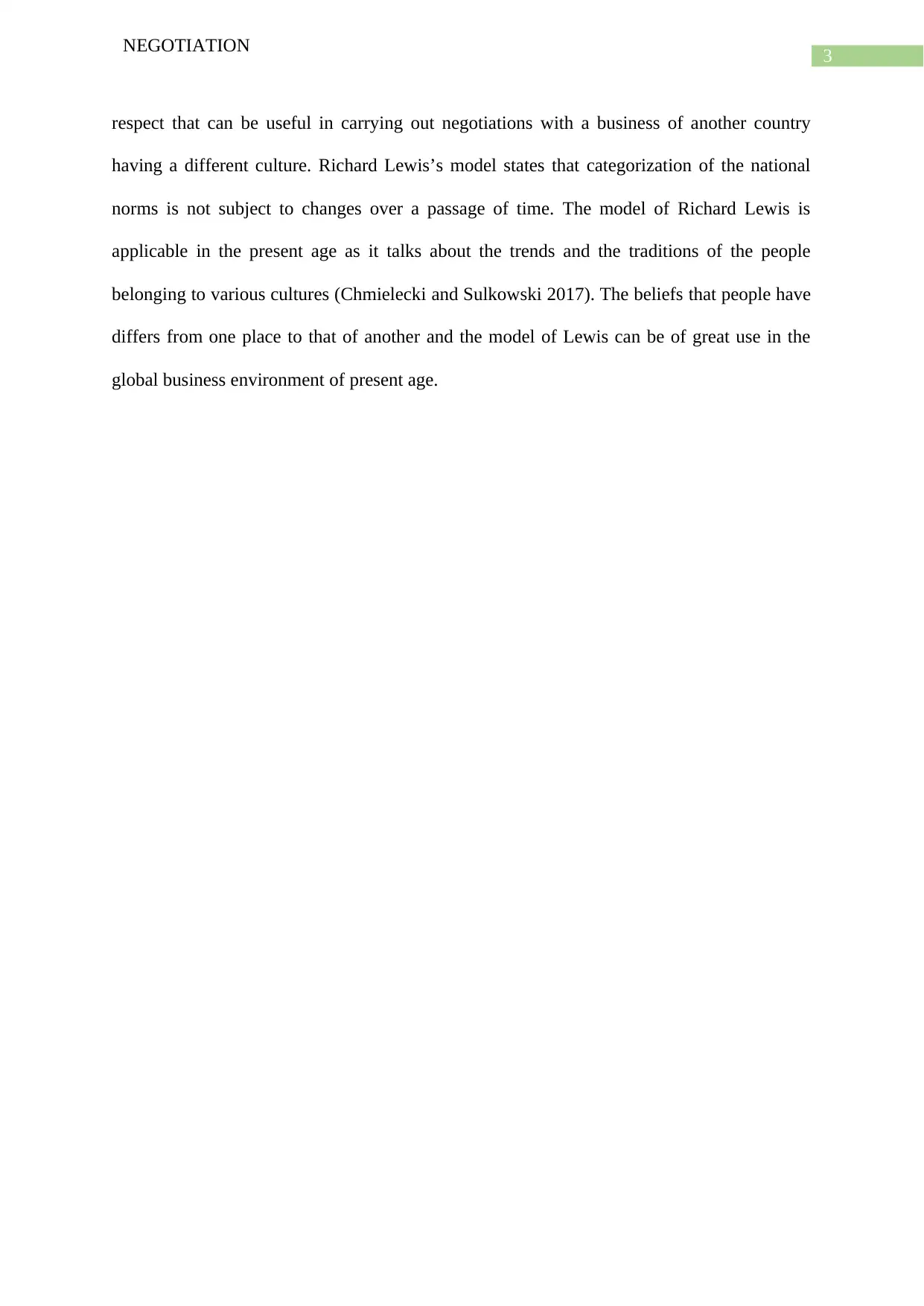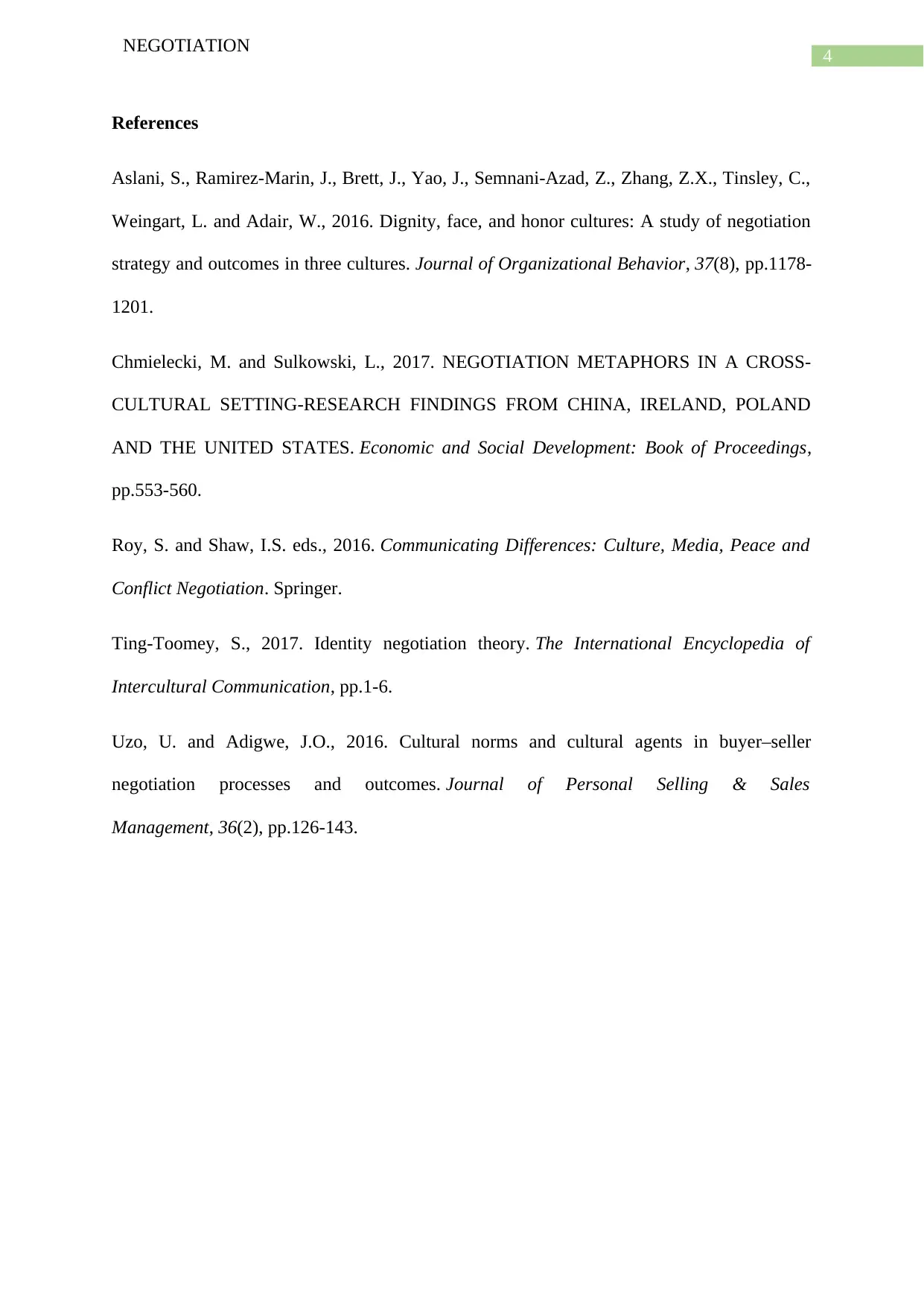Enron's Negotiation in India: A Case Study of Cultural Missteps
VerifiedAdded on 2023/05/30
|5
|1037
|363
Case Study
AI Summary
This case study examines Enron's negotiation strategies in India, focusing on the cultural issues that led to significant challenges. It discusses the importance of understanding cultural nuances, such as the cost sensitivity of the Indian market and the preference for competitive bidding. The case study also highlights the need for negotiators to consider cultural aspects, including legal and political landscapes, sub-cultural differences, and risk-taking propensities. Furthermore, it references Timothy Cook's apology in China as an example of addressing cultural expectations in a collectivist society. The analysis also suggests the applicability of Richard Lewis's cultural archetypes model in the global business environment, emphasizing the importance of categorizing people based on their cultural types to succeed in international negotiations. Desklib provides access to this and other solved assignments to aid students in their studies.

Running head: NEGOTIATION
Negotiation
Name of the student
Name of the University
Author note
Negotiation
Name of the student
Name of the University
Author note
Paraphrase This Document
Need a fresh take? Get an instant paraphrase of this document with our AI Paraphraser

1
NEGOTIATION
Answer 1)
There are certain cultural issues that should have been taken into consideration by the
US energy giant called Enron before negotiating the deal in India. Enron should have taken
into cognizance that India is not a developed country and they would not be able to bear the
cost of electricity. It is costlier as compared to the traditional source pertaining to fuel and the
people in India would prefer the coal that is used by the Indian population. The cultural issue
that should have been taken into account by Enron pertains to the standard of living of the
people of India. Before carrying out the negotiation, Enron should have thought about the fact
that the electricity tariff would result in hurting of the poor. Cultural issues pertained to
capital cost of project along with payment plan should have been taken into consideration by
Enron before starting of the project (Roy and Shaw 2016). There was public opposition in
relation to the project as the project was not open to the concept of competitive bidding.
Answer 2)
Negotiators should take into account cultural aspects that can help in the development
of a negotiation strategy. The negotiators should be able to understand their strengths along
with weakness that can help them in carrying out a negotiation deal. One can become
successful in relation to negotiation if the process of negotiation is carried out like a diplomat.
The laws and the changing politics of a place should be considered by a negotiator before
carrying out the process of negotiation. In the event of carrying out cross-cultural negotiation
the sub-cultural differences should be given importance that can help in the aspect of
successful negotiation. The ideological differences between the countries should be
understood before the process of negotiation is carried out (Ting‐Toomey 2017). The
negotiation can evolve to become successful if the foreign laws are properly understood
before starting the process of negotiation. The negotiator should understand if there exist any
NEGOTIATION
Answer 1)
There are certain cultural issues that should have been taken into consideration by the
US energy giant called Enron before negotiating the deal in India. Enron should have taken
into cognizance that India is not a developed country and they would not be able to bear the
cost of electricity. It is costlier as compared to the traditional source pertaining to fuel and the
people in India would prefer the coal that is used by the Indian population. The cultural issue
that should have been taken into account by Enron pertains to the standard of living of the
people of India. Before carrying out the negotiation, Enron should have thought about the fact
that the electricity tariff would result in hurting of the poor. Cultural issues pertained to
capital cost of project along with payment plan should have been taken into consideration by
Enron before starting of the project (Roy and Shaw 2016). There was public opposition in
relation to the project as the project was not open to the concept of competitive bidding.
Answer 2)
Negotiators should take into account cultural aspects that can help in the development
of a negotiation strategy. The negotiators should be able to understand their strengths along
with weakness that can help them in carrying out a negotiation deal. One can become
successful in relation to negotiation if the process of negotiation is carried out like a diplomat.
The laws and the changing politics of a place should be considered by a negotiator before
carrying out the process of negotiation. In the event of carrying out cross-cultural negotiation
the sub-cultural differences should be given importance that can help in the aspect of
successful negotiation. The ideological differences between the countries should be
understood before the process of negotiation is carried out (Ting‐Toomey 2017). The
negotiation can evolve to become successful if the foreign laws are properly understood
before starting the process of negotiation. The negotiator should understand if there exist any

2
NEGOTIATION
kind of financial insecurity owing to international monetary factor before striking a deal.
Language of the country with whom one wants to engage in negotiation should be understood
correctly that can help in establishing trust between the negotiating countries. Negotiation can
evolve to become successful if the risk taking propensity of the other country with whom one
is carrying out negotiation is understood in the proper light (Aslani et al. 2016).
Answer 3)
The CEO of Apple Timothy Cook apologized to the customers of Apple in China as
there were problems in relation to the warranty policy of Apple. The CEO promised that he
would try to rectify the issue that can help in building successful relations with the customers
in China. China has a collectivist culture that lays stress on the aspect of apology. In a
collectivist culture, trust can be repaired with the help of apologies (Roy and Shaw 2016).
The cross-cultural business negotiations can be successful in the event of the parties coming
at an agreement. The CEO was aware of the fact that China has a collectivist culture that puts
the needs of the community above the needs of the individual. People belonging to
collectivist culture support other people that helps them in working together in a group.
Understanding the point of view of other people can help people in reaching at an agreement.
Answer 4)
According to me, model of Richard Lewis in relation to cultural archetypes can be
applicable in the present global business environment. The Richard Lewis model lays stress
on the three categories: linear-actives, multi-actives and the reactives. It helps in dividing the
people on the basis of their natures and cultural types that can help the business in succeeding
in the global environment of the present age. There are some people who like to plan and
there are others who can carry out many activities at a time (Uzo and Adigwe 2016). The
model of Richard Lewis categorises people based on the element of courtesy along with
NEGOTIATION
kind of financial insecurity owing to international monetary factor before striking a deal.
Language of the country with whom one wants to engage in negotiation should be understood
correctly that can help in establishing trust between the negotiating countries. Negotiation can
evolve to become successful if the risk taking propensity of the other country with whom one
is carrying out negotiation is understood in the proper light (Aslani et al. 2016).
Answer 3)
The CEO of Apple Timothy Cook apologized to the customers of Apple in China as
there were problems in relation to the warranty policy of Apple. The CEO promised that he
would try to rectify the issue that can help in building successful relations with the customers
in China. China has a collectivist culture that lays stress on the aspect of apology. In a
collectivist culture, trust can be repaired with the help of apologies (Roy and Shaw 2016).
The cross-cultural business negotiations can be successful in the event of the parties coming
at an agreement. The CEO was aware of the fact that China has a collectivist culture that puts
the needs of the community above the needs of the individual. People belonging to
collectivist culture support other people that helps them in working together in a group.
Understanding the point of view of other people can help people in reaching at an agreement.
Answer 4)
According to me, model of Richard Lewis in relation to cultural archetypes can be
applicable in the present global business environment. The Richard Lewis model lays stress
on the three categories: linear-actives, multi-actives and the reactives. It helps in dividing the
people on the basis of their natures and cultural types that can help the business in succeeding
in the global environment of the present age. There are some people who like to plan and
there are others who can carry out many activities at a time (Uzo and Adigwe 2016). The
model of Richard Lewis categorises people based on the element of courtesy along with
⊘ This is a preview!⊘
Do you want full access?
Subscribe today to unlock all pages.

Trusted by 1+ million students worldwide

3
NEGOTIATION
respect that can be useful in carrying out negotiations with a business of another country
having a different culture. Richard Lewis’s model states that categorization of the national
norms is not subject to changes over a passage of time. The model of Richard Lewis is
applicable in the present age as it talks about the trends and the traditions of the people
belonging to various cultures (Chmielecki and Sulkowski 2017). The beliefs that people have
differs from one place to that of another and the model of Lewis can be of great use in the
global business environment of present age.
NEGOTIATION
respect that can be useful in carrying out negotiations with a business of another country
having a different culture. Richard Lewis’s model states that categorization of the national
norms is not subject to changes over a passage of time. The model of Richard Lewis is
applicable in the present age as it talks about the trends and the traditions of the people
belonging to various cultures (Chmielecki and Sulkowski 2017). The beliefs that people have
differs from one place to that of another and the model of Lewis can be of great use in the
global business environment of present age.
Paraphrase This Document
Need a fresh take? Get an instant paraphrase of this document with our AI Paraphraser

4
NEGOTIATION
References
Aslani, S., Ramirez‐Marin, J., Brett, J., Yao, J., Semnani‐Azad, Z., Zhang, Z.X., Tinsley, C.,
Weingart, L. and Adair, W., 2016. Dignity, face, and honor cultures: A study of negotiation
strategy and outcomes in three cultures. Journal of Organizational Behavior, 37(8), pp.1178-
1201.
Chmielecki, M. and Sulkowski, L., 2017. NEGOTIATION METAPHORS IN A CROSS-
CULTURAL SETTING-RESEARCH FINDINGS FROM CHINA, IRELAND, POLAND
AND THE UNITED STATES. Economic and Social Development: Book of Proceedings,
pp.553-560.
Roy, S. and Shaw, I.S. eds., 2016. Communicating Differences: Culture, Media, Peace and
Conflict Negotiation. Springer.
Ting‐Toomey, S., 2017. Identity negotiation theory. The International Encyclopedia of
Intercultural Communication, pp.1-6.
Uzo, U. and Adigwe, J.O., 2016. Cultural norms and cultural agents in buyer–seller
negotiation processes and outcomes. Journal of Personal Selling & Sales
Management, 36(2), pp.126-143.
NEGOTIATION
References
Aslani, S., Ramirez‐Marin, J., Brett, J., Yao, J., Semnani‐Azad, Z., Zhang, Z.X., Tinsley, C.,
Weingart, L. and Adair, W., 2016. Dignity, face, and honor cultures: A study of negotiation
strategy and outcomes in three cultures. Journal of Organizational Behavior, 37(8), pp.1178-
1201.
Chmielecki, M. and Sulkowski, L., 2017. NEGOTIATION METAPHORS IN A CROSS-
CULTURAL SETTING-RESEARCH FINDINGS FROM CHINA, IRELAND, POLAND
AND THE UNITED STATES. Economic and Social Development: Book of Proceedings,
pp.553-560.
Roy, S. and Shaw, I.S. eds., 2016. Communicating Differences: Culture, Media, Peace and
Conflict Negotiation. Springer.
Ting‐Toomey, S., 2017. Identity negotiation theory. The International Encyclopedia of
Intercultural Communication, pp.1-6.
Uzo, U. and Adigwe, J.O., 2016. Cultural norms and cultural agents in buyer–seller
negotiation processes and outcomes. Journal of Personal Selling & Sales
Management, 36(2), pp.126-143.
1 out of 5
Your All-in-One AI-Powered Toolkit for Academic Success.
+13062052269
info@desklib.com
Available 24*7 on WhatsApp / Email
![[object Object]](/_next/static/media/star-bottom.7253800d.svg)
Unlock your academic potential
Copyright © 2020–2025 A2Z Services. All Rights Reserved. Developed and managed by ZUCOL.